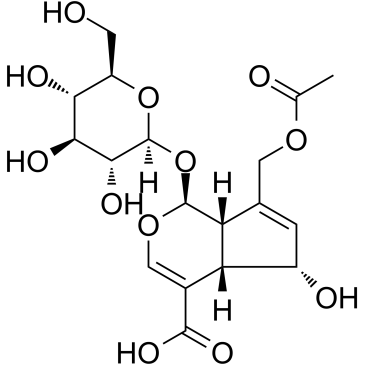Asperulosidic Acid |
| Katalog-Nr.GC35412 |
AsperulosidinsÄure (ASPA), ein bioaktives Iridoidglykosid, wird aus den KrÄutern von Hedyotis diffusa Willd extrahiert.
Products are for research use only. Not for human use. We do not sell to patients.

Cas No.: 25368-11-0
Sample solution is provided at 25 µL, 10mM.
Asperulosidic Acid (ASPA), a bioactive iridoid glycoside, is extracted from the herbs of Hedyotis diffusa Willd. Asperulosidic Acid (ASPA) has anti-tumor, anti-oxidant, and anti-inflammatory activities[1].ASPA is related to the inhibition of inflammatory cytokines (TNF-α, IL-6) and mediators via suppression of the NF-κB and mitogen-activated protein kinase (MAPK) signaling pathways[2].
Asperulosidic Acid (ASPA) (40-160 μg/mL; pre- 1 hour) significantly down-regulates the mRNA levels of TNF-α and IL-6 in LPS-induced RAW 264.7 cells compared with the group treated with LPS alone [1].Asperulosidic Acid (ASPA) (40-160 μg/mL; pre- 1 hour) decreases IκB-α phosphorylation in a concentration-dependent manner, decreases Erk1/2 phosphorylation at all concentration levels, but there was no effect on p-p38 [1]. RT-PCR[2] Cell Line: RAW 264.7 cells
[1]. Xianyuan L , et al. Anti-renal fibrosis effect of asperulosidic acid via TGF-β1/smad2/smad3 and NF-κB signaling pathways in a rat model of unilateral ureteral obstruction. Phytomedicine. 2019 Feb;53:274-285. [2]. He J, et al. Asperuloside and Asperulosidic Acid Exert an Anti-Inflammatory Effect via Suppression of the NF-κB and MAPK Signaling Pathways in LPS-Induced RAW 264.7 Macrophages. Int J Mol Sci. 2018 Jul 12;19(7). pii: E2027.
Average Rating: 5 (Based on Reviews and 34 reference(s) in Google Scholar.)
GLPBIO products are for RESEARCH USE ONLY. Please make sure your review or question is research based.
Required fields are marked with *




















